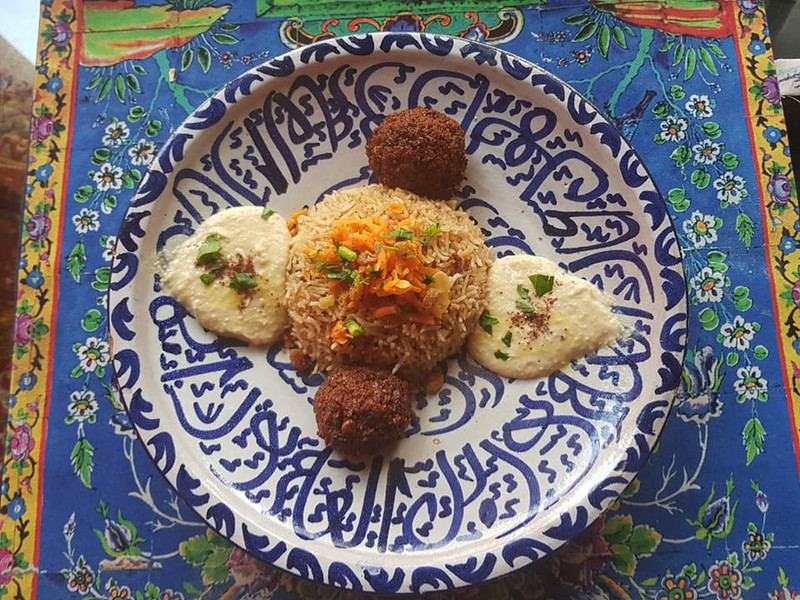[ad_1]
In a softly-lit interior decorated with colourful cloths and glinting metal ornaments, restaurant entrepreneur Hamed Ahmadi and his staff serve up dishes from Afghanistan, Bangladesh, Turkey and Greece, just to name a few countries.
Owner Ahmadi says it represents an ever-growing record of the migrants working in the restaurant and their long, perilous journeys to Europe.
Ahmadi, now 39, arrived in Italy from Afghanistan in 2006 to present a documentary at Venice Film Festival.
However, as the situation back home worsened, Ahmadi and his team were forced to seek asylum in Italy and move to a reception centre near Venice.
The centre was Ahmadi’s home for eight months, and it was during this period that the first serendipitous events occurred that would lead to a flourishing chain of restaurants.
After a few months, Ahmadi established an informal language exchange between the centre’s occupants and students of Venice’s Ca Foscari University studying oriental languages.
Ahmadi’s last months in the reception centre coincided with an influx of refugee minors to Italy. Venice’s city council invited Ahmadi to act as a linguistic and cultural mediator, having noted his language exchanges.
Ahmadi began to run events in the sprawling grounds of the reception centre to distract the young refugees struggling from the uncertainty of their future. “They didn’t know if they would get documents, jobs, a house,” says Ahmadi.
One such event was a festival with around 40 young people of varying nationalities. “There are two fundamental elements for a party, food and music, so we put our heads together to plan a menu,” recalls Ahmadi.
Ahmadi came up with the idea of a menu that reflected the story of everyone there, the story of their journey to Europe. “When someone from my country leaves to come here, they have to cross seven or eight borders illegally and spend from €6,000 – €10,000,” Ahmadi explains, “but the majority of kids here don’t have these resources so they stop on the way in Turkey or Iran, for example, to earn more for the next stage of the journey.”
The recipes they invented during this journey became the basis for the festival’s menu. Not only did it result in a magnificent cornucopia of creative dishes, but it allowed each participant to introduce themselves and recount their journey to Europe through their food.
Soon, Ahmadi and his menu were being requested for other festivals, and Ahmadi saw the opportunity for a business that could benefit the reception centre refugees, many by now turning 18 and in need of a job.
“They had to leave the centre [after eight months] and many would have been out on the street or would have to go to another country to seek work,” says Ahmadi. “For the little I could do, I wanted to be helpful.”
Thus, Orient Experience was born.
The restaurant started out as a takeaway joint and soon became popular with locals. “We have a lot of vegetarian foods which, in that period, was not common in the city but was becoming fashionable,” explains Ahmadi. It also provided a low-cost food option in a city notorious for its pricey restaurant scene. Not long after, Ahmadi opened another branch which, in 2016, provided space for sit-in diners.
Most of Ahmadi’s staff are recruited from the reception centre. Although most have never experienced work in a restaurant, they can intern for a period, and then have the chance to become employees and even business partners.

Each new staff member brings something to the restaurant’s menu based on their migrant journey. Ahmadi mentions one such dish, kabuli di pollo.
This Afghan dish is usually made with rice, lamb, raisins, carrots, almonds and spices. “However, when one of the guys found himself in Turkey without enough money to buy lamb, he called his Mum and asked if he could use cheaper chicken instead,” he recounts, “and by changing the type of meat this dish became his experience.”
For Ahmadi, Orient Experience is just the beginning of a potentially Europe-wide project to employ migrants and raise awareness about their dangerous journeys.
He has already opened Africa Experience in Venice, “because Italy is the gateway for many migrants arriving from Africa.”
Knowing little about this culinary world, Ahmadi decided to host Masterchef-style competitions for the reception centre refugees.
“In the final rounds, we were in a hospitality school in Venice and we had 50 or 60 people taste each dish, it was a lot of fun,” recalls Ahmadi.
The restaurants have enjoyed great success. Ahmadi explains that this is partly thanks to the creative dishes, fresh ingredients and vegan and vegetarian options.
But he also credits the stories behind the food, the melting pot of cultures and the way the restaurant welcomes diners to experience these other realities. Ahmadi adds, “We are all young, many are just starting out in work, so we have a lot of energy and curiosity.”
Hamed Ahmadi will feature in a Netflix original series Waffles + Mochi hosted by Michelle Obama and starting March 16.
[ad_2]
Source link
